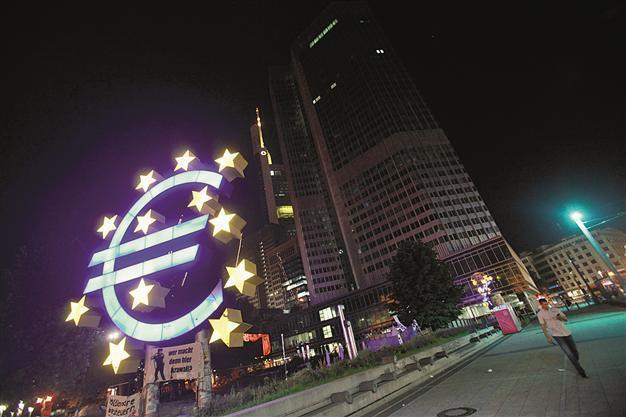ECB slashes key rate to boost flagging eurozone
FRANKFURT - The Associated Press

Sculpture showing the euro currency sign is seen in front of the ECB headquarters in Frankfurt. The ECB cuts it key rate to 0.75 pct to boost the European economy. REUTERS photo
The European Central Bank (ECB) has cut its key interest rate by a quarter percentage point to a record low of 0.75 percent yesterday.
The move followed a rate cut by China’s central bank and new stimulus measures by the Bank of England. The ECB cut in the refinancing rate is aimed at giving a further boost to the sagging European economy after a summit last week where leaders agreed on new steps to strengthen the euro currency.
The refinancing rate cut could mean lower borrowing costs for banks, businesses and consumers. Some economists say it may have only a symbolic effect, since rates are already very low. Lending activity remains weak because there’s little demand from businesses for credit.
The ECB also cut its overnight deposit rate - what it charges banks for depositing their money with the ECB overnight - to zero. That is meant to encourage banks to invest their money in the economy rather than stash it with the ECB.
Bank of England injects 50 bln pounds into economy
Meanwhile, the Bank of England yesterday backed another 50 billion pounds ($78 billion) injection into the ailing British economy.
The move by the Bank of England’s Monetary Policy Committee was widely anticipated and raises the amount it is pumping into the British economy since March 2009 to 375 billion pounds. It is the first stimulus since February.
Under the so-called quantitative easing program, the Bank purchases British government bonds, known as gilts, from banks, in the hope that they will use the money to lend to businesses and consumers.
The new purchases are expected to take 4 months to complete.
Britain is officially in recession, defined as two consecutive quarters of negative growth.
Concerns that the bank’s monetary largesse has stoked inflation have eased recently, with consumer price inflation falling to 2.8 percent last month. As recently as last September, inflation was as high as 5.2 percent, more than double the Bank’s official 2 percent target.
In a statement, the Bank said that without more stimulus it was increasingly likely that inflation would fall below the official 2 percent target in the medium term because of tight credit conditions, the government’s deficit-reduction program as well as the debt crisis in the 17-country eurozone.
Though Britain is not part of Europe’s single currency, the eurozone is the country’s main trading partner.
